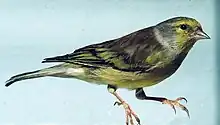| Corsican finch | |
|---|---|
 | |
| Scientific classification | |
| Domain: | Eukaryota |
| Kingdom: | Animalia |
| Phylum: | Chordata |
| Class: | Aves |
| Order: | Passeriformes |
| Family: | Fringillidae |
| Subfamily: | Carduelinae |
| Genus: | Carduelis |
| Species: | C. corsicana |
| Binomial name | |
| Carduelis corsicana (Koenig, 1899) | |
| Synonyms | |
| |
The Corsican finch (Carduelis corsicana), also known as the Corsican citril finch or Mediterranean citril finch, is a bird in the true finch family, Fringillidae.
Formerly, both it and the Citril finch were placed in the genus Serinus, but they appear to be close relatives of the European goldfinch (Arnaiz-Villena et al., 1998).
Distribution
It is endemic to the Mediterranean islands of Corsica, Sardinia, Elba, Capraia and Gorgona.
Description
It has dark-streaked brown upperparts and brighter yellow underparts than the citril finch does.

Taxonomy
The first formal description of the Corsican finch was by the German zoologist Alexander Koenig in 1899 under the binomial name Citrinella corsicana.[2] It was formerly regarded a subspecies of the citril finch, but it differs in morphology and vocalizations (Förschler & Kalko, 2007) as well as mtDNA sequence (Sangster, 2000, contra Pasquet & Thibault, 1997, Förschler et al. 2009) and they are now considered distinct species (Sangster et al., 2002, Förschler et al. 2009).
References
- ↑ BirdLife International (2017) [amended version of 2016 assessment]. "Carduelis corsicana". IUCN Red List of Threatened Species. 2017: e.T22729538A111147051. Retrieved 3 June 2020.
- ↑ Koenig, Alexander (1899). "Eine neu Vogelart von der Insel Corsica". Ornithologische Monatsberichte (in German). 7 (7): 120.
- Arnaiz-Villena, A., Alvarez-Tejado, M., Ruiz-del-Valle, V., Garcia-de-la-Torre, C., Varela, P., Recio, M., Martinez-Laso, J. (1998). Phylogeny and rapid Northern and Southern Hemisphere speciation of goldfinches during the Miocene and Pliocene Epochs. Cellular and Molecular Life Sciences, 54(9), 1031–1041.
- Arnaiz-Villena, A., Gómez-Prieto, P., & Ruiz-de-Valle, V. (2009). Phylogeography of finches and sparrows. Animal Genetics", New York, NY: USA: Nova Pub.[1]
- Förschler, M.I.; Kalko, E.K.V. (2007). "Geographical differentiation, acoustic adaptation and species boundaries in mainland citril finches and insular Corsican finches, superspecies Carduelis [citrinella]". Journal of Biogeography. 34 (9): 1591–1600. doi:10.1111/j.1365-2699.2007.01722.x. S2CID 28037228.
- Förschler, M.I.; Senar, J.C.; Perret, P.; Björklund, M. (2009). "The species status of the Corsican Finch Carduelis corsicana assessed by three genetic markers with different rates of evolution". Molecular Phylogenetics and Evolution. 52 (1): 234–240. doi:10.1016/j.ympev.2009.02.014. PMID 19249374.
- Pasquet, E.; Thibault, J.-C. (1997). "Genetic differences among mainland and insular forms of the Citril Finch Serinus citrinella". Ibis. 139 (4): 679–684. doi:10.1111/j.1474-919x.1997.tb04691.x.
- Sangster, G (2000). "Genetic distance as a test of species boundaries in the Citril Finch Serinus citrinella: a critique and taxonomic reinterpretation". Ibis. 142 (3): 487–490. doi:10.1111/j.1474-919x.2000.tb04447.x.
- Sangster, George; Knox, Alan G.; Helbig, Andreas J.; Parkin, David T. (2002). "Taxonomic recommendations for European birds". Ibis. 144 (1): 153–159. doi:10.1046/j.0019-1019.2001.00026.x.
- Zamora J, Moscoso J, Ruiz-del-Valle V, Lowy E, Serrano-Vela JI, et al. (2006) Conjoint mitochondrial phylogenetic trees for canaries (Serinus spp.) and goldfinches (Carduelis spp.) show several specific polytomies. Ardeola 53: 1–17. S2CID 46892185
External links
